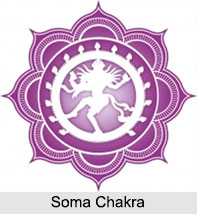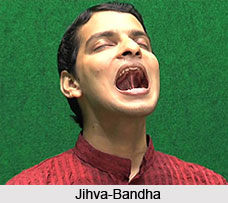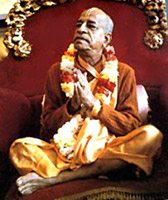
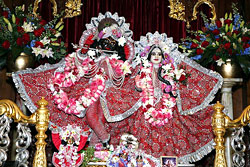 The International Society for Krishna Consciousness (ISKCON), also known as `the Hare Krishna` movement, was founded in 1966 in New York City by A.C. Bhaktivedanta Swami Prabhupada. ISKCON is based on the scriptures Bhagavad Gita and Srimad Bhagavatam. The distinctive appearance of the movement and its culture come from the Gaudiya Vaishnava tradition. Gaudiya Vaishnavism had a continuous following in India, especially West Bengal and Orissa for the past five hundred years
The International Society for Krishna Consciousness (ISKCON), also known as `the Hare Krishna` movement, was founded in 1966 in New York City by A.C. Bhaktivedanta Swami Prabhupada. ISKCON is based on the scriptures Bhagavad Gita and Srimad Bhagavatam. The distinctive appearance of the movement and its culture come from the Gaudiya Vaishnava tradition. Gaudiya Vaishnavism had a continuous following in India, especially West Bengal and Orissa for the past five hundred years
ISKCON was formed to spread the practice of Bhakti yoga where the Bhaktas or the devotees dedicate their thoughts and action towards pleasing the Supreme Lord Krishna. Devotees consider Radha to be the female counterpart ,the embodiment of love The devotees of ISKCON belief that the individual soul is an eternal personal identity which does not ultimately merge into any formless light or void as suggested by the monistic (Advaita) schools of Hinduism.
The popular nickname of "Hare Krishnas" for devotees comes from the mantra that devotees sing aloud or chant quietly on rosary-like beads, called Japa mala
This mantra, known also as the Maha Mantra, contains the names of God `Hare`, `Krishna` and `Rama`. The sound vibration created by repeating these names of God gradually induces pure God-consciousness, or "Krishna consciousness." A common ISKCON expression is "We are not this body." That is, we are all spirit souls who are temporarily trapped in a material body and its cares and woes. Their goal is to break away from samsara (endless repetitive reincarnations) and return to the kingdom of God.
ISKCON is arranged in two ways: an order of monks and priests who live at a temple and members of ISKCON who leave outside the temple They receive a Sanskrit name (one of the many names of God) plus the suffix "dasa," which means "servant of...," and saffron colored robes, dhotis, to signify celibacy. Married monks wear white dhotis. Female residents of a temple wear traditional saris and do not shave their heads. All monks promise to abandon cigarettes, alcohol and other drugs, reject gambling, and follow a non-violent vegetarian diet. They also make a commitment to chant the names of God a prescribed number of times each day. They rise before sunrise and chant and pray at intervals during the day. Celibacy is preferred and is mandatory for single devotees.
Members living outside the temple wear regular clothing and work regular jobs. Many live near a temple, follow a vegetarian diet, do some prayer and chanting at home, and come to the temple at least once a week, usually for the "Sunday Feast." ("Sunday Feasts" are held at Hare Krishna temples around the world, where anyone can come and participate in the chanting, dancing, and feasting on vegetarian food offered to the Lord.)
When Srila Prabhupada first incorporated ISKCON in 1966 he defined seven purposes for the organization. They are as follows
•
To propagate spiritual knowledge to society at large, balance the values of life and to achieve real unity and peace in the world.
•To propagate Krishna consciousness, as it is revealed in the Bhagavad-gita and the Srimad-Bhagavatam.
•To bring the members of the society together and also nearer to Krishna the Supreme God .
•To spread the message of Krishna by way of publishing and distributing periodicals, magazines, books and other writings
•To erect for the members, and for society at large, a holy place of transcendental pastimes, dedicated to the personality of Krishna
•To teach and encourage the sankirtana movement, congregational chanting of the holy names of God as revealed in the teachings of Lord Sri Chaitanya Mahaprabhu.
•To bring the members closer together for the purpose of teaching a simpler and more natural way of life.
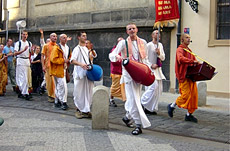 ISKCON is actively evangelistic (emphasizing on personal conversion) Members try to spread Krishna consciousness, primarily by singing the Hare Krishna mantra in public places and by selling books written by A. C. Bhaktivedanta Swami Prabhupada There are ISKCON communities around the world with schools, restaurants and farms.
The adminstration of ISKCON is managed by the Governing Body Commission (or GBC) created by Prabhupada in 1972 to gradually take on the responsibility of his management duties while still being under his care. Originally it was made up of 12 people and has since grown in size to include 48 senior members from the movement who make decisions based on consensus of opinion rather than any one person having ultimate authority. It has continued to manage affairs since Prabhupada`s passing in 1977.
ISKCON follows the traditional system of disciplic succession, in which teachings upheld by scriptures are handed down from master to disciple, generation after generation.
ISKCON is actively evangelistic (emphasizing on personal conversion) Members try to spread Krishna consciousness, primarily by singing the Hare Krishna mantra in public places and by selling books written by A. C. Bhaktivedanta Swami Prabhupada There are ISKCON communities around the world with schools, restaurants and farms.
The adminstration of ISKCON is managed by the Governing Body Commission (or GBC) created by Prabhupada in 1972 to gradually take on the responsibility of his management duties while still being under his care. Originally it was made up of 12 people and has since grown in size to include 48 senior members from the movement who make decisions based on consensus of opinion rather than any one person having ultimate authority. It has continued to manage affairs since Prabhupada`s passing in 1977.
ISKCON follows the traditional system of disciplic succession, in which teachings upheld by scriptures are handed down from master to disciple, generation after generation.


